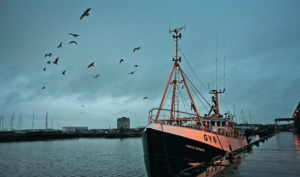Here are some snapshots of modern Britain, taken by a well-known broadcaster, playwright and social commentator. The railways are dying; car traffic is thriving. To the drivers, who interact with their fellow human beings mainly by injuring and killing them, the country is just a “roar and muddle outside the windows”. The wealth gap between North and South is wider than ever. Workers have been forced to move out of cities to cheerless suburbs a long ride from their place of work.
Regions are losing their identity. Professional football teams no longer field any local players, and local newspapers are disappearing, replaced by “some mass publication thrown at [the public] like a bone to a dog”. These organs of hatred publish indignant lies about workers bingeing on champagne and immigrants taking advantage of our great traditions of hospitality. The “miserable meanness” of the press faithfully reflects “this present age of idiotic nationalism, political and economic”.
The year was 1933. J.B. Priestley, born in Bradford in 1894, had been commissioned by the Left-wing publisher, Victor Gollancz, to spend two months travelling through rural and industrial England, from the honeyed manor houses of the Cotswolds to the stinking slums and slippery cobblestones of the Black Country, Lancashire and Tyneside. The vaguely defined “North” was a foreign country even to some members of the London establishment who were supposed to represent it. This geographical blindness appears to be a chronic condition. Several visitors from the South who have stayed at my home on the Anglo-Scottish frontier were surprised to discover that Carlisle is not a Scottish city, and that Hadrian’s Wall is not the national border.
Along with Daniel Defoe’s Tour Thro’ the Whole Island of Great Britain and William Cobbett’s Rural Rides, Priestley’s English Journey is one of the great travelogues of English literature. He talked to actual people and stayed in each place long enough to suffer the effects of its architecture, food and air. He listened rather than interviewed, jotting down the chatter of factory workers, bus passengers, commercial travellers, tramps in a hostel, women at a whist drive, slum children at a multi-ethnic primary school. The result is a work of bracing televisual intensity. There is none of the metropolitan prissiness that makes so many English travelogues, historically speaking, a waste of time.
Priestley wrote like an opinionated anthropologist with an ear for a good joke and a rare ability to communicate in different forms of English: “As a rule I like local accents, and have kept one myself. They make for variety in speech and they give men’s talk a flavour of the particular countryside to which at heart they belong. Standard English is like standard anything else — poor tasteless stuff.” Reading Priestley today, it strikes me that the “local accents” he relished were micro-dialects, peculiar to certain towns, small districts or even occupations. Received pronunciation may still be dominant, as Amol Rajan complained this year, but the remedy is not necessarily within easy reach. We also now have standard Yorkshire, standard West Country and standard Cockney, which can be just as flavourless.
Just over two years after Priestley returned to London (in a smog so thick that all he saw of England through the windscreen was “a large wobbling green rectangle” on the back of a removal van), George Orwell set off on his own voyage of grim discovery. He, too, had been commissioned by Victor Gollancz. The fruit of two ghastly months in Lancashire and Yorkshire, The Road to Wigan Pier, was published by the Left Book Club in 1937.
Seeking out the worst “the North” had to offer, Orwell was expiating the guilt he felt as an old Etonian and as a former officer in the Imperial Police Force in Burma, where duty had compelled him to bully and punch the natives. (“Orientals can be very provoking.”) His journey was an exercise in figurative and literal blacking-up — crawling along mine-shafts, sleeping in hostels and boarding houses infested with human “black beetles”, as he called them with pince-nez distaste. “Is it ever possible to be really intimate with the working class?” he wondered. He generalised and supposed, identified this and that “sort of person”, and came to his own and to no one else’s conclusions.
The Road to Wigan Pier begins with the weariest cliché of life “oop North”: “The first sound in the mornings was the clumping of the mill-girls’ clogs down the cobbled street.” Curiously, Priestley had recently observed that “clogs have disappeared, for though they were really very sensible footwear for work, being healthy, comfortable and cheap, they carried a bad social stigma on them, even when I was young”. “Clumsy clogs”, Orwell speculatively calls them when trying to catch the eye of a young woman seen from his seat on the train. He supposes that she must have been poking a stick up a blocked kitchen waste-pipe: her face wore “the most desolate, hopeless expression I have ever seen”.
This kind of moral means-testing and stereotyping is still quite common in metropolitan and even local writing about the North of England. Why assume that the woman was desolate and hopeless? I hate to think what my face looks like when I’m doing it, but in the long and varied list of necessary household jobs there can be few more engrossing and ultimately rewarding than rodding out a drain.
Priestley had his own forms of bigotry. He loathed the “violent racial prejudices” which blighted the lives of mixed-race children in Liverpool, but in the same decaying city, he yearned for the day when all Irish labourers would be cleared out of every western port from Cardiff to the Clyde: “what a fine exit of ignorance and dirt and drunkenness and disease!” At a public meeting in Bristol, he found the black-shirted Fascists as pathetically insignificant as the Communists with their “rising of the masses”: “Who cares about masses? … Men, women and children — but not masses.” Yet when he celebrated “the West Indian flavour” of Bristol, he was referring not to people, but to the tobacco and chocolate industries.
It is a shame that, while Orwell’s northern odyssey is still a common point of political reference, Priestley’s more wide-ranging, less dictatorial survey rarely gets a mention. English Journey is said to have helped Labour win the 1945 general election by giving a friendly face to the frighteningly faceless victims of capitalism. Priestley himself stood as an independent socialist candidate (he came third in Cambridge behind Labour and the Conservatives). He believed that centralised government and national party politics were stifling democracy and that England should be divided into four, five or six partially self-governing “provinces”: “politics should be local, so that you can keep an eye on them”. Today’s Labour Party, with its plans for devolution, could usefully employ him as a posthumous consultant.
At Westminster, Priestley’s omnivorous intellect would have been a liability. He was quite happy to publish findings which might have supported the arguments of his opponents. There must be some politicians today who would do this for the sake of an honest discussion, but I don’t know who they are. Both Priestley and Orwell condemned the blithe assumption that one shouldn’t feel sorry for people who work in deadening and dangerous occupations because “they’re used to it”. Unlike Orwell, however, Priestley noticed that many people enjoyed working in a factory. At an electrical components plant in the Potteries, the workers were “brisk and contented” despite the production-line monotony. The women who did nothing but attach labels to pairs of socks at a textile factory in Leicester were astonishingly cheerful. They preferred a job of pure routine because “they could then work all day and think about something else while they were working”.
So much of Priestley’s post-First World War England is familiar that a few months ago I began to wonder whether most of the big changes in British society since 1933 were simply adjustments or variations in very long-term trends. Living in the far north of Cumbria, I find some of the picturesque period details quite up-to-date. I know people who are happy to work in factories, who find coach travel “voluptuous” and who drink the “brown speckled mess” that, hereabouts, could still claim to be “the national drink”: “We are all floating somewhere on a full tide of tea.”
There is, however, one glaring difference which reassured me that our age of post-Brexit opportunities has brought something new to British history.
Neither Priestley nor Orwell say very much about politicians, except in a general sense. They chide governments for being oblivious or indifferent to poverty and squalor, and for sitting in a haze of self-congratulation in Westminster while the City plays games with the riches that the industrial North has manufactured and dug out of the ground. But they say nothing of elected and unelected parliamentarians lobbying for their own interests, promoting the cowardly, the idle and the vicious, and causing death and unhappiness for the benefit of their political careers.
Missing from Priestley’s English Journey and Orwell’s Road to Wigan Pier are Prime Ministers plotting coups, gambling away the nation’s wealth, lying in the face of evidence and shame, and installing the “miserable meanness” of the popular press in the heart of government. The fact that these are after all, despite the similarities, chronicles of a bygone age should give hope that the current virulent outbreak of Westminster parochialism is a passing phase. Priestley’s book would be just the thing for a north-bound fact-finding minister to read while waiting for the next uncancelled train to Outer England.
***
Order your copy of UnHerd’s first print edition here.
Disclaimer
Some of the posts we share are controversial and we do not necessarily agree with them in the whole extend. Sometimes we agree with the content or part of it but we do not agree with the narration or language. Nevertheless we find them somehow interesting, valuable and/or informative or we share them, because we strongly believe in freedom of speech, free press and journalism. We strongly encourage you to have a critical approach to all the content, do your own research and analysis to build your own opinion.
We would be glad to have your feedback.
Source: UnHerd Read the original article here: https://unherd.com/



